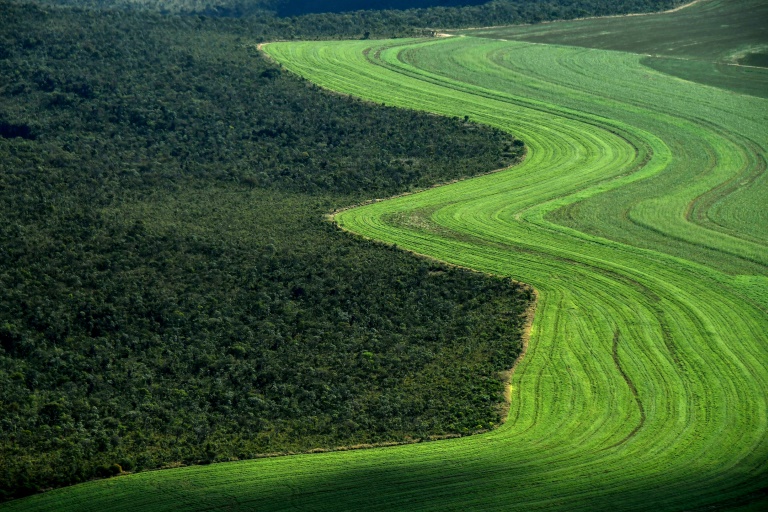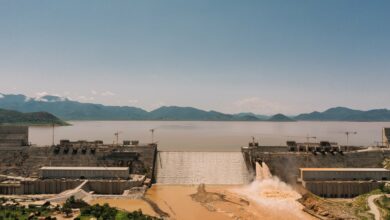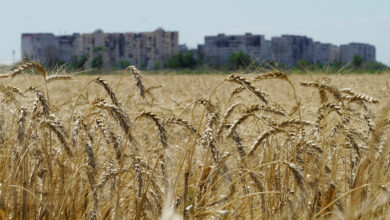This is the second part of an exclusive interview with Dr. Ray Bush, professor of african studies and development politics at the University of Leeds, in which he gives a detailed account of the state of Egyptian agriculture and discusses possible solutions to relieve the plight of farmers.
Al-Masry Al-Youm: Could you speak a little bit more on the horrors of Egypt’s countryside?
Ray Bush: Apart from the systematic character of rural violence I mentioned earlier, the remoteness of rural people from the public eye means that instances of violence are much less easy to hold to account and publicize. But aside from that, the whole other process of drudgery in the countryside relates to absence of work. When you have 47 percent living on less than a feddan, 90 percent on less than five, then there is a struggle to produce enough for self provisioning. People then also need access to the market to buy goods which they cannot produce, like kids’ clothes, books and kerosene. But how do you get access to the market if you don’t have work and cash? So what you’ve seen over the last 20 years is an increased burden on rural people, and women in particular, where they become very lucky to even find work that pays wages. In fact what has tended to be the case is that they’ve had to engage in a whole varied range of survival strategies within and outside the household.
Al-Masry: What are some of those survival strategies?
Bush: Well the reinstatement of indentured labor for starters.
Al-Masry: What is indentured labor?
Bush: It means labor hiring which isn’t a product of the market, which market liberalizers have advocated as the ideal for the growth of the economy. Rather it’s the hiring of workers by labor gangs for short-term ‘contracts’ which are carried out in really awful conditions.
Al-Masry: Could you elaborate a bit?
Bush: Well this is part of the problem. If you start to admire rural people for their livelihood strategies and coping mechanisms you fail to remember that the real issue is the lack of attention to the systemic inequality that is forcing them to have to adopt the livelihood strategies that they do. So I don’t want to focus on the inventiveness and the strength of the people, which goes without saying. What’s more important is how can you address the need for them to do what they’re doing. And the only way you can do that is either them getting access to more land, and/or work employment for them to gain income from salaries. And that’s why the new government has to think about rural work and rural wages, and to fashion a strategy to retain earnings for national social investment rather than allow it to escape to European banks for private gain.
Al-Masry: What do you think needs to be done?
Bush: Well what people, and successive governments fail to understand is that the country’s biggest assets are its people. People keep saying “Oh God, too many people, lets look at population control, there’s not enough land!” But actually, that question needs to be turned around. You’ve got 80 million, then what you’ve got to do is translate number into effective demand for goods and services, which means that if those people have money to buy goods and services, you boost the economy. And they’ll only be able to do that if you improve living standards. And you’ll only improve living standards if you find them work and employment opportunities. And that will not come from simply the rhetoric of the old rent based economy of oil, gas, the Suez [Canal] and labor migration. It will come from investment domestically and nationally for production of assets of goods and services locally and nationally, rather than relying so heavily on what is seen to be the magic bullet of direct foreign investment (DFI) which only goes into the skewed picture of the Egyptian economy of oil and gas.
Al Masry: Seeing how agriculture is so essential to Egypt’s economic growth, why do you think it’s ignored and neglected?
Bush: Well there are two reasons. The first is the short-term interests of the ruling elite, which is their self and immediate aggrandizement, and the other is the political weakness of the peasantry. So, until the peasantry mobilize and sustain their resistance in a way that they have been doing recently, through which are emerging political agendas being set to allow farmers to be part of new strategies, the political weakness of the farmers will ensure that they continue to be mistreated.
Al-Masry: Despite the fact that agricultural reform is necessary for Egypt’s future?
Bush: Oh, yes. Necessity doesn’t come into the short-term interests of politicians. They are concerned first of all with maintaining their own power, and then maintaining their own economic interest. Which is why the power of the street has to hold them accountable.
Al-Masry: So the fighting force will be the power of the streets?
Bush: The fighting force must be the farmers, workers and youth identifying a common interest in popular mobilization to drive democratic agendas for action. Indeed there is the emergence of new political forces that recognize that if 40 percent of Egyptians have rural interests and links to the countryside, then they will have to be part of the new Egypt.
Al-Masry: What do you see as being a feasible solution, or goal for farmers in the streets, to aim for in times to come?
Bush: I think if you put the idea of the need for redistributive land reform on one side, one of the easiest and most important initiatives is for cooperatives to be reinvented and reinstated.
Al-Masry: What is a cooperative?
Bush: A cooperative in terms of agriculture is when you have ventures that are owned and run jointly by its members, and so the profits are spread and shared among them. Production and marketing co-ops are the most regular ones. A production cooperative is either to cooperate on farming particular land, or deciding on what is produced, where and how, and then how the benefits from that production will be organized. A marketing cooperative revolves around which produce is collected and then the outcomes and the benefits of the sale is shared and distributed amongst those who market.
Al Masry: Hasn’t Egypt seen cooperatives before?
Bush: Well yes, during Nasser times cooperatives were instated, and they were used mainly for two things: one was to gain a political control over the peasantry, but the other was to, for the first time, give peasants rights in access to relatively cheap inputs of seeds, fertilizer and pesticide. So it was quite a top down cooperative structure which many farmers clearly resisted and were angry about at the same time recognizing the benefits of it as well.
Al-Masry: And so what happened to the cooperatives?
Bush: Well one of the things Youssef Wali, erstwhile minister of agriculture, did was break up the co-ops and the Principal Bank for Development and Credit was run down and agricultural credit and extension to small farmers became non-existent.
Al-Masry: And the old regime probably played on their negative views of cooperatives?
Bush: Absolutely. This was part of a socialist party, it wasn’t part of modern Egypt. But what’s interesting to me is that if you ask farmers what has been the biggest shock or the biggest problem, they’ll say it is to no longer have cooperatives. So for many years farmers have lamented the failure of the old cooperative and longed for some new facility allowing them access to inputs.
Al-Masry: And so now you think this idea of cooperatives can be reinvented?
Bush: I think it will be. I think one of the things that the ministry will see is the possibility of co-ops as a way of providing some producers with whatever seeds or types of initiatives the ministry wants to use. It’s an obvious and relatively quick fix. My fear is that it will be another network of top down driven cooperatives rather than ones that emerge from the farmers themselves. One thing is clear. To stop the backsliding into persistent rural conflict and rural impoverishment that was the hallmark of the Mubarak period, there will need to be persistent farmer mobilization. And the mobilization will need support from urban allies to promote the understanding that a democratic and more just post-revolutionary Egypt needs unity between progressive social forces in the town and countryside.



